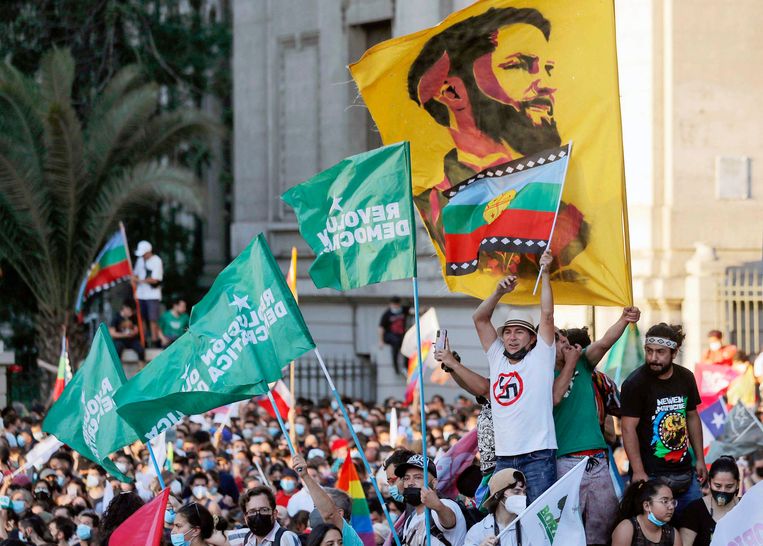
After the young leftist Gabriel Borek’s victory in the elections, analysts in the international media are talking about a A victory for Chilean democracy. Why was this election so important?
It was the most polarizing election in Chile since the dictatorship of Augusto Pinochet, from 1973 to 1990. Since then, the center-left and center-right parties have alternated in the country’s government. But none of these parties really reformed Pinochet’s radical free-market thinking. In Chile, inequality is still institutionalized.
This has been under discussion in the country for at least a decade, thanks mainly to the Chilean youth who grew up after the dictatorship and took to the streets in droves in recent years. Under pressure from those protests, incumbent President Sebastian Pinera called a referendum on Pinochet’s neoliberal constitution. Most Chileans voted to write a new constitution.
In all of these turmoil, Chile’s political landscape has also changed. This is how the relative strangers appeared: from the far right José Antonio Caste to the leftist Borek, who was actually one of the men from the student protests.
This weekend, there were two political streams on the ballot that were almost diametrically opposed. The tension was to die for. This resulted in a landslide victory for Borek, who was soon recognized by his opponent, Caste, to the relief of Chile. A more compact result was expected and therefore uncertain a priori.
in Peru defeated this summer He is also a left-wing candidate, a far-right opponent in the final round. Is the far right losing its strength in Latin America?
It’s hard to generalize, because the context varies enormously. The quadrants will now fall like this many times. A leftist candidate also won in Honduras last month. But countries in Latin America often have a solid left heart and a right heart in one chest. Borek has now won in Chile, and The winner takes it all. Nevertheless, millions voted for a hard-right candidate who flirted with Pinochet’s ideas. These feelings did not suddenly disappear.
One party often follows the other. This is also due to the electoral system. Only two candidates remained in the last round, while a large number of people in the first round supported the other candidates. The leftist Pedro Castillo turns out to be the lesser of two evils in Peru, although the difference with the daughter of dictator Keiko Fujimori was minimal. In Chile, there is no doubt that many people voted for Borek because they did not want a prime minister.
In Brazil too, most likely, a left-wing politician will face a far-right candidate in the final round next year. Doesn’t Bolsonaro seem a little nervous about these kinds of outcomes?
“I suspect that Bolsonaro has been very nervous for a long time, but especially about opinion polls in his country, which are becoming increasingly unfavorable to him. It must be strange if Brazil does not choose the left winger Lula again next year. Just as Bolsonaro profited from his hatred of Lula in 2018, Lula is now again the answer to the Bolsonaro disaster.At the same time, I must say: anything can happen in Brazil.
Will Borek’s victory give new energy to leftist movements in the region, such as the Lula movement in Brazil?
‘absolute. Just a year ago, the legalization of abortion in Argentina was a boost for feminist movements across Latin America, and so were Borek’s gains for progressive groups in other countries. These progressive winds are unstoppable in the long run, I expect, despite the fact that leaders of the left and right often alternate.
Each country here is a world in itself, but the neighboring countries certainly look at each other. If Lula becomes president next year, he will be glad to have an ideological ally at the head of Chile. The more allied countries there are, the more attempts will be made to form leftist alliances to fan the flames even more.
Many left-wing political parties in Latin America, for example, are critical of the United States. When many countries get left-wing government, self-confidence towards the United States, which is seen as grand imperialism, increases. If Lula wins, these left-wing leaders – I think Andres Manuel Lopez Obrador here with me in Mexico – will undoubtedly come together and be pretty much in agreement.
Finally: The Netherlands is closed due to the omikron variant, can you still take to the streets in your Mexico City location?
“Some cases of omicron have already been reported in the region, but concerns remain limited in Mexico. The Covid national czar said the alternative is more contagious, but not more dangerous. So Mexico continues along the same lines.
“In terms of the Corona numbers, things are going well for Mexico – and indeed with all of Latin America. Brazil, which has suffered so badly from the pandemic, is doing better than ever before. Let’s hope we don’t find ourselves in all sorts of horrible scenarios again during the course of the pandemic. Two months In the meantime, I look at Europe, realizing that what is happening there will soon repeat itself here.

“Infuriatingly humble social media buff. Twitter advocate. Writer. Internet nerd.”








